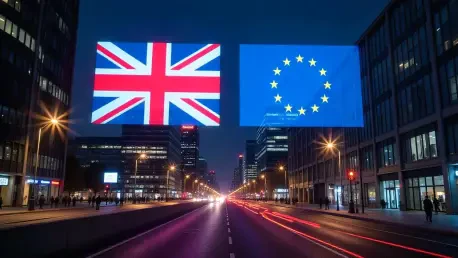In recent political developments, the United Kingdom and the European Union have intensified efforts to finalize a significant post-Brexit agreement aiming to streamline travel and enhance trade relationships. The negotiation process has zeroed in on critical areas, including immigration rules, defense cooperation, trade and food standards, youth mobility, and other contentious elements that have surfaced since Brexit. Central to this negotiation is a potential agreement allowing UK passport holders to utilize EU e-gates at airports, a change anticipated to ease travel burdens for British citizens who have experienced disruptions since the UK’s departure from the EU. The talks are currently in an advanced stage, with Minister Nick Thomas-Symonds at the forefront, working diligently to secure a deal that offers tangible benefits such as smoother travel arrangements, fortified defense connections, and improved trade conditions. This endeavor is crucial in addressing the trade and travel hiccups Britain has faced post-Brexit, focusing on alleviating passport queue complications and simplifying border checks affecting food imports and exports.
Strategic Negotiations and Proposed Agreements
The negotiations aim to rectify some of the complexities British citizens have encountered in travel and trade since Brexit, and discussions are not just confined to travel but encompass a broader scope of cooperative initiatives. A central theme emerging from these high-stakes discussions is the desire for smoother passport procedures across European airports, alleviating the long waits British travelers have been subjected to, essentially targeting the root causes of delays and enhancing operational fluidity. Furthermore, there’s a marked effort toward aligning food standards, addressing bureaucratic hurdles that currently impinge on food commerce between the regions. Included in the proposed deal is improved defense cooperation, offering the UK access to a substantial €150 billion EU defense fund. Such access aims to strengthen security conditions and present collaborative solutions to ongoing challenges like the unrest in Ukraine.
Additionally, trade and food standards have taken center stage, with parties looking to pave the way for seamless exchanges devoid of excessive regulation. This alignment with select EU food standards is positioned as a sovereign initiative to facilitate smoother trade flows, yielding lower costs and enhancing economic relationships mutually. Another key proposal under negotiation is a forward-thinking youth mobility scheme, intended to open pathways for young individuals from the UK and the EU to live and work in each other’s regions. This scheme is designed to echo existing arrangements with countries such as Australia and New Zealand, offering widened opportunities and fostering cultural and professional exchange. Though promising, this proposal has faced scrutiny, with critics warning of potential undermining of Brexit philosophies by reintroducing semblances of free movement.
Political Reactions and Tensions
The ongoing negotiations illustrate a broader tapestry of political reactions in the UK, reflecting contrasting viewpoints on post-Brexit maneuvers and the intricate balance of practical needs with sovereign ideals. Critics, including influential figures like Conservative MP Alex Burghart and Reform UK leader Nigel Farage, express concern that aligning dynamically with EU standards might be antithetical to Brexit principles, posing a threat to sovereignty and potentially altering future trade agreements. Burghart raises alarms over implications of ECJ jurisdiction, while Farage faults cooperation under perceived EU oversight, viewing the mobility scheme as laying the groundwork for increased migration rates. In stark contrast, Liberal Democrat MP Calum Miller advocates for a more ambitious relationship with the EU, suggesting a customs union could extend economic surety and revenue gains.
These diverse viewpoints underscore the challenging landscape of UK politics, exposing governmental hurdles in attaining consensus over post-Brexit strategies. The debate continues over how best to reconcile practical benefits with ideological convictions, prompting critical assessments of the strategic direction in pursuit of diplomatic collaboration. As the UK grapples with these varied perspectives, the broader discussion on how to leverage cooperative measures against foundational Brexit tenets remains contentious but essential.
Diplomatic Front and Future Prospects
On the diplomatic front, Minister Thomas-Symonds frames the discussions as driven by pragmatism, focusing on the practicalities of jobs, reducing household expenses, and bolstering border efficiency while counterbalancing skepticism over policy implications. The negotiations include other contentious topics, such as EU student tuition rates at UK universities and possible reductions in NHS fees for European nationals, with ongoing discussions exploring the extension of EU fishing rights in UK waters and acknowledgment of professional qualifications. These multifaceted discussions lay the groundwork for reconciling past grievances while advancing collaborative frameworks that promise mutual benefits.
Efforts are expected to culminate in a significant bilateral summit, where Sir Keir Starmer alongside EU figures Ursula von der Leyen and Antonio Costa anticipate announcing the finalized deal. This event is forecasted to mark a historic moment in diplomatic consensus, symbolizing endeavors to repair post-Brexit relations and reshape UK-EU interactions by focusing on future-focused strategies and practical solutions. As these diplomatic negotiations unfold, the emphasis on reconciling parallel interests and forging new pathways of engagement and cooperation remains paramount for both sides as they move toward this pivotal agreement.
Expected Outcomes and Long-term Implications
Recently, the United Kingdom and the European Union have heightened their efforts to seal a major post-Brexit deal designed to streamline travel and bolster trade ties. Key negotiation points include immigration policies, defense collaboration, trade, food standards, youth mobility, and other contentious areas that have arisen since Brexit. A focal point of the discussion is the prospective agreement that would permit UK passport holders to access EU e-gates at airports. This adjustment is expected to alleviate travel difficulties for British citizens who have encountered disruptions following the UK’s exit from the EU. The negotiations are advanced, with Nick Thomas-Symonds leading the charge to secure a deal that promises palpable advantages like hassle-free travel, strengthened defense ties, and enhanced trade relations. Addressing the challenges Britain faces in trade and travel post-Brexit, the talks aim to tackle passport queue issues and streamline border procedures impacting food import and export operations.









